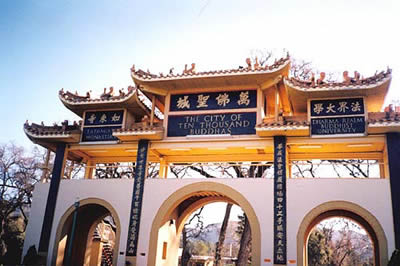Valerie Tseng 親虹講於2012年12月1日星期六晚上萬佛城大殿
 幾年前在「國家地理」上—「國家地理」是一個非常有名的美國雜誌—刊登了一個特殊報告:「世界各地分佈了很多神聖的地方;這些神聖的地方就像眾神的手像散落在風中的種子一樣,散落在世界各地。
幾年前在「國家地理」上—「國家地理」是一個非常有名的美國雜誌—刊登了一個特殊報告:「世界各地分佈了很多神聖的地方;這些神聖的地方就像眾神的手像散落在風中的種子一樣,散落在世界各地。
從古老的亞洲、非洲、歐洲到美洲新世界,到遙遠的大洋洲,這些地方的古老文化,這些世界上神聖的地方穿越了國家和文化的疆界。它們中的一些被視作神聖的現代神話,其它的一些被視作和地球一樣古老;它們中的每一個都是人類崇高偉大的精神所產生的地方。
當我看到萬佛城也在那份報導的世界地圖上被標作很多神聖地方的其中之一時,我高興得跳了起來。我想:終於,我最喜歡的這個地方,得到了世界的認同。
在CTTB有大的和小的動物把這裡當做家,每天早晨的寧靜和自然的美麗,在這裡成為了一道奇觀。當我留心的時候,我早上醒來感恩我的生活,珍惜我醒來的每一個小時;因為我在這樣一個美麗的地方,這裡的美麗是由內而外的。
在世界上有很多人現在在受苦受難,同時也有很多全球的自然災害向我們襲來。我經常提醒我自己,不要把我現在所得的當做應得的。對於我來說,謙虛的萬佛城,依然是一個沒有被挖掘的寶藏,而且經常被誤解。我希望我們的道場可以持續美好,然後把希望和博愛傳播得更遠。
大概在一年多以前,在八月的時候,我從灣區搬到了Ukiah,我的女兒當時在最後一分鐘,決定參加佛根地的「佛學夏令營」。當時這個事情是發生在「佛根地」的最後一天,當每一個人在分享他們關於這段時間的一些反思;有趣的是這個「佛根地」的主題是關於佛教性,所以我現在在萬佛城做志工,主要是教女校小學部,同時也幫DRBU大學的一個新項目—申請鑑定。
我來到萬佛城這個過程出乎意料地自然,沒有遇到什麼太大的問題,可能是因為這個地方的生活方式,和我產生了共鳴。實際上,在萬佛城鼓勵我過一個更豐富的人生,同時練習我的佛學。我在這裡生活得更簡單、更環保,花費得更少、更節儉,懂得了更多,更留心,同時也更感恩。
然而還是有一些顧慮,可能我在這裡不會過得很自然;因為我從一個高科技的環境,搬到了寧靜的鄉村,這對我來說是一個很大的改變。我成長在一個不是亞洲的國家,這個對於我來說,成了一個很大的文化弱點。但最後我相信上人幫助我在這裡生活得很好。他知道我的愚鈍和我的完美主義,所以他經常成為我腦中智慧的聲音。在萬佛城要很快樂地生活,我發現有一個很純樸的本性和正直、誠實、善良的本性,對在這邊快樂的生活很重要。
是因為我的女兒,我才來到這個地方。從最開始的時候,我只是想要做一些很偉大、很棒的事情;我從一開始我做我能夠做的事情,到我想貢獻我能做的一切事情,為了誠實的做事,所有事情都不是很複雜。
我經常被周圍的環境所鼓舞,當有人需要幫助的時候,在萬佛城的人就主動地去幫助他們,事情就是這麼簡單。住在萬佛城的人經常互相溝通。當他們發現有一些需要的時候,就共同幫助完成這件事情;就是這樣簡單的心態,完成了最美麗的事情。我覺得這就是做事的最好的方法。
所以我每天生活都很繁忙,儘管我是有教書執照的教師,我在這裡的課堂上,只有我在以前公立學校教書一半的學生;但是在這邊教書的這一年,我發現對我來說是很大的考驗。
我的學生每天在課堂上,她們知道對我來說是一個很大的考驗;因為她們很難保持安靜,很愛聊天。我發現對我來說,如果想製造有意義的對話,是一個很大的考驗,我經常需要把二年級、三年級學生的活力,轉成她們在學業上和在課堂活動的正面能量。
我們的老師不僅要負責學生的學術成就,同時也要負責他們的人格培育。幫助今天的年輕的一代形成完整的人格是一個很大的考驗,所以當學生發生爭執、傷害彼此,我們需要做調停者;當學生在他們起伏不定的感情當中迷失的時候,我們需要幫助他們找到原因,然後幫助他們恢復平靜。
有的時候在每天這樣戲劇性的學生波動當中,我們感到非常疲憊,但是每一天對於我們來說,都像是一張白紙。最終,學生從我們的教育當中獲得了關於人的本性的很好的瞭解,而且幫助了我的修行。五祖曾經對六祖說:「不要下結論下得太早,因為佛法是從經歷困難當中得到的。」這句話一直影響著我、激勵著我前行。
Buddha曾經遇見很多不同的人,有一些是國王,或者是有很高的職位,其它的人生活在貧困當中,還有一些人是在社會上很有影響力、很傑出的。實際上,佛影響著不同的人,以不同的方式。根據他遇到的不同的人,根據每一個人不同的生活方式,佛提供給每一個人最適合他的教育。但不管佛是與哪一個人進行交流,他教育這個人的方式都是一樣的,是要幫助這個人從他的幻覺當中,和錯覺當中醒悟,然後認識和學習佛法,認識到關於生活的真諦,然後幫助他們走向更領悟的人生。
佛,教會我在我每一天的生活當中,儘管我經常感覺不到。這每天生活當中都有毒箭從各個方向射向我們,有的是愛之箭,可能是很強烈的愛、可能是錯覺、可能是貪婪、忿怒、無知、傲慢;在任何時候,我們都可以被其中一支毒箭射中,被中傷。
比如說,當我們的眼睛和這個感觀世界有交流的時候,我們看到了事物的不同形狀和樣子;在看到這些事物的一瞬間,這些喜歡和不喜歡的箭就射向了我們。當我們遇到我們喜歡的事情的時候,我們就努力的奔向它們,然後從我們的腦,遠離那些我們不喜歡的事情。在我們每一天的生活當中,像這樣的想法經常地出現,然後我們開始追隨各種不同的事情,我們的思想、我們的心態得不到寧靜。
就像這些毒箭一樣,佛告訴我們:「這些有毒的箭就和錯覺一樣。」貪婪、忿怒、無知、傲慢、個人偏見,這些都是各種箭,射向我們,可以對我們造成傷害。
在任何時刻,如果我們產生任何這樣的想法,我們就像被一支有毒的箭射中一樣,我們失去了健康,失去了寧靜的心態;我們在身體上和精神上都得不到平衡,變得不滿、難過,非常痛苦,這些對我們造成了很多的苦難。
聽到佛對我們的這些教育,很多人開始意識到其中的真諦。他們開始後悔,後悔他們曾經在這些快感當中迷失。他們曾經以為這些快感帶給他們舒適的生活;實際上他們不知道他們是在身體和心靈上,傷害了自己。
有了這些意識,當這些人想到佛曾經是一位王子,經歷了人生中的各種奢華,他們不禁會問:為什麼佛願意去放棄這麼舒適的生活,而去經歷數不盡的苦難、痛苦而達到他的精神面的培養?為什麼他能夠這麼堅定地去進行他的精神上的鍛鍊?
當我意識到這些的時候,我很快地停止了我這些錯誤的作法。我希望能拔出這些箭,很快地能拔出這些已經射向我的箭。
我非常感激上人和萬佛城的每一個人,為我提供了一個避開這些毒箭的避難所。感謝這個避難所,人類的靈魂和偉大的精神,可以自由地遨翔。
謝謝大家!恆哲師要我分享一下我的個人經歷,謝謝大家聽我講我的感想。也謝謝劉喆幫我翻譯,這是她第一次翻譯,她很緊張!阿彌陀佛!
Valerie Tseng
CTTB Buddha Hall Sharing
December 1, 2012
 Buddhas and Bodhisattvas, Venerable Master, Dharma Masters, and Good Knowing Advisors … Amitofo
Buddhas and Bodhisattvas, Venerable Master, Dharma Masters, and Good Knowing Advisors … Amitofo
A few years ago, in a special report, the National Geographic, a well known US magazine wrote:
“Sacred sites lay scattered across the globe, spread like seeds to the wind as if by the hands of gods. From the cradles of ancient civilizations in Asia, Africa, and Europe to the newer world of America to the farthest reaches of Oceania, the world’s holiest places transcend national and cultural boundaries. Some are hallowed by reports of modern miracles, and others are as old as the Earth itself. Yet each, when encountered, is a place where the human spirit can soar with a sense of the sublime.”
I jumped with joy when I spotted CTTB on that world map, named as one of those sacred sites. I thought, “At last, a worldly recognition of one of my favorite places.” Some animals, small and large take refuge here. The morning tranquility and natural beauty here is a wonder. When I am mindful, I wake up grateful for my life and cherish spending most of my waking hours in such a truly beautiful place – beauty inside and out. While so many people are in suffering and while so many global disasters strike, I constantly remind myself not to take for granted what I have. To me, humble CTTB is still an undiscovered treasure and often misunderstood. I hope our monastery will continue to ripple sublime goodness and bring hope to humanity far and near.
It was just over a year ago, in August that I moved to Ukiah from the Bay Area. My daughter made a last minute decision to attend Instilling Goodness Elementary during our retreat at Buddha Root Farm. Actually, it occurred on the last day of the retreat, after everyone shared personal reflection of the week. Interestingly, the theme of the retreat was the Bodhi Resolve. So, here I am at the City of Ten Thousand Buddhas, volunteering. I mainly teach elementary students at our girl school and assist with DRBU’s new program which is applying for accreditation. My transition here was surprisingly smooth. Perhaps it was because the lifestyle here resonates with me. In fact, CTTB encourages me to live a richer life practicing the Dharma … to live more simply, to be more environmental, to consume less, to be more frugal, to be more understanding, more mindful, more grateful etc.
Nevertheless, there were concerns that I might not survive (here in this new environment/lifestyle). Coming from a high tech environment to the countryside itself, is a significant shift. Growing up in a non-Asian country puts me at a cultural disadvantage. In the end, I believe I got help from the Venerable Master. He knows of all my foolishness and idealism, so he has been the voice of reason. To be happy at CTTB, I found that it is important to have pure intentions and work from a heart of sincerity, integrity, good faith, and honesty. It is easy to take things for granted as time passes by and lose that enthusiasm that shone at the beginning.
So, my daughter brought me here. From the very start, it was not about wanting to become something or to achieve great things. It was just about doing what I could, trying to contribute within my capacity. To be honest, it’s nothing complicated. I was inspired to mirror my surrounding. When help is needed, people at CTTB just see what’s needed and do it. It’s that simple. When residents come across needs and find that something ought to be done, they do it. That kind of simple heart is the most beautiful, I think, and doing what needs to be done is the best way.
Hence, I’m busy every day. Though I am a credentialed teacher and I have half the class size I had teaching in public school, I have a challenging class this year. The dynamics of my students make everyday seems a challenge to stay tranquil. Instead of chatty talks, I have to nurture purposeful conversations. I have to direct energetic, playful 2nd and 3rd graders to put on hold their natural tendency to socialize, to stay on task with their class work, to be attentive. Our teachers are responsible not only for students’ academic achievement but also their character development. Helping today’s generation form wholesome character can be quite an endeavor. So, when students fight or hurt each other, we have to be peace makers. When they become lost in their cyclic emotions, we have to help them find reason and light. There are days when teachers are exhausted from all the drama in our class, but every day is like a blank sheet of paper. Ultimately, students have brought great insights about the human nature and helped me cultivate. When the fifth Patriarch transmitted the Dharma to the Sixth Patriarch he said to him, “Do not speak too soon, for the Buddhadharma arises from difficulty.” This inspires me to move forward.
In his lifetime, the Buddha met many different kinds of people. Some were kings and ministers of court; some were people who lived in poverty, yet others were prominent and influential people of society. In fact, the Buddha interacted with people from all walks of life. Depending on the people he encountered, he offered the teaching most suited to their conditions in life. But no matter who he spoke to, his purpose in giving teachings was always the same—such as to help people awaken from delusion so they may aspire to learn the Dharma, realize the true nature of life, and begin walking the path of enlightenment.
The Buddha teaches me that in daily life, though I am often not aware of it, there are poisoned arrows constantly coming at us—they are arrows of love (very strong liking), delusion, craving, greed, anger, ignorance, arrogance, opinion, arising and disappearing. At any moment, we could get hit by one of these poisoned arrows and become seriously injured. For example, as our eyes make contact with the sensory world with all its forms and sights, in the space of an instant, the arrow of like and dislikes hits us. With this liking, we pursue the thing that we like and run away from what we dislike. In our everyday life, thoughts of this nature are constantly arising. We start to chase after all sorts of things. Our minds know no peace.
Just as strong liking is a poisoned arrow, the Buddha says, so is delusion. Craving, greed, anger, ignorance, arrogance, opinion, arising and disappearing are all arrows that can speedily cause us harm. At the moment we give rise to any such thought, we are hit by a poisoned arrow. We lose our wellbeing and peace of mind. We become physically and spiritually off-balance—discontent, distressed, wretched, and miserable. This creates a lot of suffering in us.
Hearing this teaching, many people began to see the truth of what the Buddha said. They started to feel a sense of regret and remorse at having been so lost in the pleasures of their comfortable lives that they were unaware of how they were injuring themselves physically and spiritually. With this seed of awareness, they thought of the Buddha who had once been a prince and enjoyed life’s luxuries. Why had the Buddha been willing to give up such a comfortable life to undergo innumerable hardships and difficulties for his spiritual practice? Why was he able to remain so firm in his commitment to spiritual practice?
The Buddha once had a very good life. But in the midst of it, he came to realize that if he continued to indulge in pleasures, he was actually wearing himself out physically and spiritually. Such a life does a lot of harm. We could go through our entire life like this, and in doing so, we life would become a waste and we would accumulate a lot of negative karma through our behavior. Somewhat realizing this, I wanted to immediately put a stop to it. I wanted to dodge the arrows, and for the ones I’d already been hit by, to quickly pull them out.
In conclusion, I am grateful to the Venerable Master and everyone at the City of Ten Thousand Buddhas for creating this shelter from poisoned arrows. Thank you for this refuge where “the human spirit can soar with a sense of the sublime”, as described by the National Geographic.
Amitofo!
